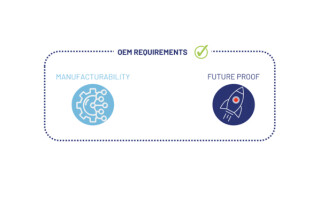Factories of The Future Are Using Machine Learning Analytics to Optimize Assets
October 20, 2020
Story

From food to cars to complex manufacturing machinery, quality is a top concern of manufacturers. Factors such as safety, efficiency, and reliability affect quality and influence customer satisfaction.
From food to cars to complex manufacturing machinery, quality is a top concern of manufacturers. Factors such as safety, efficiency, and reliability affect product quality and ultimately influence customer satisfaction. Sourcing, design, testing, and inspection all play a crucial role in ensuring products meet the bar when it comes to quality. Product inspections at early stages in the production cycle help reduce risks and cost. While inspections can be conducted at any point throughout the production process, the goal is to identify, contain and resolve issues as quickly as possible.
Many manufacturers are increasingly looking to their smart, connected machines to help with anomaly detection. These assets can alert end users of such anomalies to ensure accelerated interventions, helping maintain quality and uptime. Using advanced analytics, assets can collect user feedback or alert accuracy and improve over time. This enables higher outputs and lowers labor costs because of the reduction in time spent resolving issues.
Rockwell Automation faced significant rework times for defective circuit boards
Rockwell Automation saw an opportunity to introduce a product inspection much earlier in one of their production processes. The process involves screening conductive paste onto a circuit board and then placing ball grid arrays (BGAs), which serve as the contact point for parts added later in the process. The board then travels through several placement machines where parts are added, increasing the value of the board significantly with each part, and finally through the oven where the board is set.
Lack of early inspection often resulted in a significant amount of time spent fixing errors that occurred very early in the process. If the BGAs are not properly connected to the board, it can take 30 minutes per part to correct the work. With 12 BGAs on a board, employees were sometime spending upwards of 6 hours on replacing parts and re-working the boards. The inspection, which is an automated optical inspection, did not occur until after the board had gone through three placement machines and the oven. Rockwell Automation knew that to avoid the potential of more than 6 hours of rework for faulty BGA placement, they need to catch the issue much sooner.
Enabling machine learning to test connectivity, saving time and lowering costs
The company implemented an advanced analytics solution that scores the conductive paste profile prior to the board going through a single placement machine. Using high-speed edge computing and machine learning, the solution creates and executes a 3D model of the paste profile within 7 seconds. It then predicts whether the board will meet the quality bar or have defects. If alerted to a poor paste profile, operators can immediately stop production, remove the bad board, wash it, and send it back through the production line—a process that takes less than two minutes.
Even in the pilot process, Rockwell Automation has seen impressive results. By catching issues early in real time, they have gained back hours of productivity and kept the quality bar high. Errors that used to take 6 hours to resolve can now be determined and fixed within minutes. The solution allowed Rockwell Automation to determine paste issues right away; it only takes them two minutes to do a rework with machine learning. And, given that the value to the board comes with adding various parts, there has been a cost-saving benefit by resolving issues before any parts have been placed, reducing scrap and other waste.
Scaling similar machine learning solutions could have massive future impact
For Rockwell Automation, these new capabilities have yielded almost immediate results in the form of time and cost savings. Rockwell Automation sees massive potential for real-time analytics to improve their circuit board production across their facilities, and they are looking towards additional use cases of advanced analytics and machine learning to bring even more intelligence into their operations.




